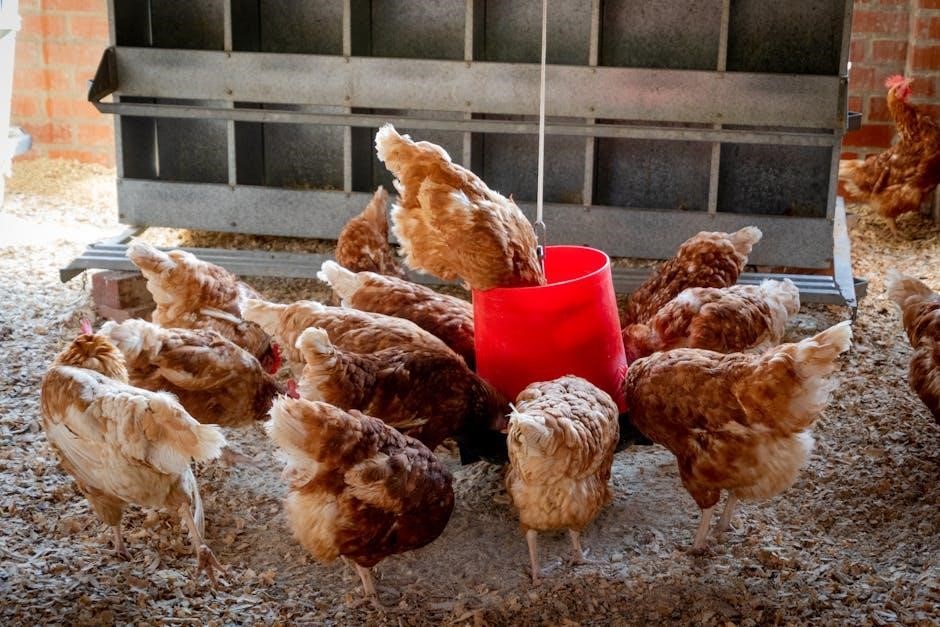advance puppy food feeding guide
Proper puppy nutrition is crucial for growth and development. Puppy food is specifically formulated to meet high energy needs and support healthy brain and physical development. Always use feeding guides on packaging to ensure balanced nutrition, as puppies require more nutrients than adult dogs. Hydration is also essential, so ensure access to fresh water alongside meals.
1.1 The Importance of Proper Nutrition for Puppies
Proper nutrition is essential for puppies to support rapid growth and brain development. Inadequate feeding can lead to health issues like stunted growth or weakened immunity.
A balanced diet ensures puppies receive the necessary nutrients for optimal health, energy, and development. Always follow feeding guides to avoid underfeeding or overfeeding, promoting a healthy foundation for life.
1.2 Key Differences Between Puppy Food and Adult Dog Food
Puppy food is formulated with higher protein and calorie content to support growth and development, while adult dog food focuses on maintenance. Puppies need more nutrients like calcium and phosphorus for bone growth. Feeding adult food to puppies can deprive them of essential nutrients, potentially stunting their development and overall health.

Understanding Your Puppy’s Nutritional Needs
Puppies require a balanced diet rich in protein, calcium, and essential nutrients to support rapid growth and energy needs. High-quality puppy food ensures optimal development.
2.1 Essential Nutrients for Growth and Development
Essential nutrients for puppies include high-quality protein for muscle growth, calcium for bone development, and vitamins like DHA for brain health. Omega-3 fatty acids support skin and coat health, while balanced minerals ensure proper growth. Advance Puppy food is specifically formulated to meet these needs, providing a complete and balanced diet for optimal growth and development. Proper hydration is also crucial for digestion and overall health.
2;2 How Breed and Size Influence Dietary Requirements
Breed and size significantly impact a puppy’s dietary needs. Larger breeds require controlled calcium and phosphorus to prevent joint issues, while smaller breeds need higher calorie intake for rapid growth. Advance Puppy food offers tailored formulations to meet these specific requirements, ensuring balanced nutrition without over-supplementation. Always consult your veterinarian to determine the best diet for your puppy based on breed and size.

Feeding Schedules for Puppies
Use feeding guides on packaging to determine portions. Adjust based on growth and activity. Ensure fresh water is always available to keep your puppy hydrated and healthy.
3.1 Recommended Feeding Frequency at Different Ages
Puppies require multiple meals daily. Newborns to 3 months need 4-6 feedings, while 3-6 months require 3-4 meals. At 6-12 months, 2-3 meals are sufficient. Adjust portions based on growth and activity levels, ensuring a balanced diet with fresh water always available.
3.2 Transitioning from Puppy to Adult Food
Transitioning from puppy to adult food begins around 12 months, depending on breed and size. Gradually mix adult food with puppy food over 7-10 days to prevent digestive issues. Ensure the adult food is nutrient-rich and suitable for your puppy’s specific needs. Consult a veterinarian for guidance tailored to your puppy’s growth and development.

Choosing the Right Puppy Food
Selecting the right puppy food involves considering factors like breed size, age, and dietary needs. Look for high-quality, nutrient-rich formulas tailored to your puppy’s growth stage and health requirements. Always consult with your veterinarian to ensure the chosen food meets your puppy’s specific needs for optimal development.
4.1 Factors to Consider When Selecting Puppy Food
When choosing puppy food, consider your puppy’s age, breed size, and activity level. Look for nutrient-rich formulas with high-quality protein sources and essential vitamins. Ensure the food is tailored to your puppy’s life stage and health needs. Always check for AAFCO certification and consult your veterinarian for personalized recommendations. Reading labels carefully helps avoid fillers and ensures balanced nutrition for optimal growth and health.
4.2 Decoding Puppy Food Labels
Understanding puppy food labels is key to making informed decisions. Look for AAFCO certification, ensuring the food meets nutritional standards. The ingredient list reveals protein sources and additives; choose options with whole meats. Check the guaranteed analysis for protein, fat, and moisture content. Avoid fillers and by-products. Labels may indicate life stages or breed sizes, helping you select the most suitable option for your puppy. Always consult your veterinarian for personalized advice.
Portion Control and Feeding Guidelines
Use the feeding chart on puppy food packaging as a starting point. Adjust portions based on your puppy’s growth, activity, and breed size to prevent overfeeding.
5.1 How to Use the Feeding Chart on Puppy Food Packaging
Locate the feeding chart on the packaging, which provides daily portion recommendations based on your puppy’s age and weight. Adjust the portions as your puppy grows, monitoring their progress to ensure they stay healthy. If unsure, consult your veterinarian for personalized advice to meet your puppy’s specific needs.
5.2 Adjusting Portions Based on Growth and Activity Levels
Monitor your puppy’s weight and adjust portions accordingly; Puppies grow rapidly, so feeding amounts may increase as they develop. Active puppies or breeds with high energy levels may require more food to meet their calorie needs. Consult your veterinarian to ensure portions align with your puppy’s growth stage and activity level, avoiding underfeeding or overfeeding.

Common Health Issues and Dietary Solutions
Puppies may face allergies, digestive issues, or nutrient deficiencies. Tailored diets, such as limited-ingredient puppy food, can address these concerns. Consult a vet for personalized advice to ensure optimal health and resolve dietary challenges effectively.
6.1 Recognizing Signs of Nutritional Deficiencies
Signs of nutritional deficiencies in puppies include weight loss, dull coat, low energy, and poor growth. Digestive issues like diarrhea or constipation may also indicate inadequate nutrition. Skin problems or weakened immunity can signal deficiencies in essential vitamins and minerals. Monitoring your puppy’s overall health and consulting a vet early is crucial to address these issues promptly and effectively.
6.2 Managing Food Allergies or Sensitivities in Puppies
Identifying food allergies or sensitivities in puppies involves monitoring symptoms like itching, skin issues, or digestive problems. Consult a veterinarian to determine the culprit ingredient and adjust the diet accordingly. Hypoallergenic puppy foods or novel protein sources can help alleviate reactions. Gradually introduce new foods to prevent upset, and avoid common allergens like beef or dairy if identified as triggers.

Advanced Feeding Tips for Optimal Health
Incorporate food enrichment activities, like puzzle toys, to stimulate mental and physical health. Use high-quality puppy food to ensure balanced nutrition for growth and energy needs.
7.1 Incorporating Food Enrichment Activities
Engage your puppy with food enrichment activities like puzzle toys and interactive feeders. These activities challenge your puppy to work for their meals, mimicking natural foraging behavior. Use puzzle bowls or treat-dispensing toys to slow down eating and reduce boredom. Food enrichment stimulates mental and physical health, making mealtime more engaging and rewarding for your puppy.
7.2 Safe and Healthy Treat Options for Puppies
Choose treats that align with your puppy’s dietary needs and avoid choking hazards. Opt for puppy-safe options like carrot sticks or training-sized kibble. Avoid unhealthy fillers and ensure treats are low in sugar and salt. Durable chew toys filled with healthy ingredients or peanut butter can also be a rewarding and safe option for puppies.

Monitoring Your Puppy’s Progress
Regularly track your puppy’s weight, growth, and energy levels to ensure proper development. Adjust feeding portions as needed and consult a veterinarian if growth seems off.
8.1 Tracking Weight, Growth, and Energy Levels
Regularly monitor your puppy’s weight and growth using a schedule or growth chart. Ensure they maintain a healthy energy level by tracking their activity. Adjust feeding portions as your puppy grows to prevent overfeeding. Proper nutrition supports brain and physical development; Always ensure your puppy has access to fresh water alongside meals for optimal hydration and digestion.
8.2 When to Consult a Veterinarian About Feeding
Consult a veterinarian if your puppy shows signs of nutritional deficiencies, such as lethargy or poor growth. Seek advice if your puppy has food allergies or sensitivities. Veterinarians can help adjust feeding plans for medical conditions or if your puppy is underweight or overweight. They ensure your puppy’s diet aligns with their specific needs and health status.

Myths and Facts About Puppy Feeding
Debunk myths about raw diets and allergies. While some believe raw diets are harmful, others swear by their benefits. Always consult a veterinarian for accurate, personalized feeding advice.
9.1 Debunking Common Misconceptions
Many believe raw diets are harmful, but they can be safe if handled properly. Others think puppies need adult food early, which is false. Puppies require tailored nutrition. Feeding human food is another myth; it can cause imbalances. Always rely on vet-approved puppy food for optimal health and development.
9.2 The Truth About Raw Diets and Puppy Nutrition
Raw diets can be safe for puppies if properly handled to avoid bacterial risks like salmonella. Critics often highlight potential dangers, but with careful preparation, raw foods can provide essential nutrients. However, ensuring a balanced diet is crucial, as deficiencies may arise. Always consult a vet before transitioning to raw feeding to guarantee optimal health and growth for your puppy.

Special Dietary Needs for Puppies
Introducing the importance of special dietary needs for puppies, especially those with medical conditions or specific breed requirements. Factors like size and health influence their feeding plans, ensuring optimal growth.
10.1 Feeding Puppies with Medical Conditions
Puppies with medical conditions require tailored nutrition to manage their health. Always consult a veterinarian to create a customized diet plan that addresses specific needs, such as limited ingredients or added supplements. Monitor progress closely and adjust feeding strategies as necessary to ensure optimal health and recovery. Proper nutrition plays a vital role in managing chronic or acute conditions effectively.
10.2 Large vs. Small Breed Puppy Diets
Large and small breed puppies have distinct nutritional needs due to differences in growth rates and energy requirements. Large breeds need controlled calcium and phosphorus to prevent joint issues, while small breeds require higher calorie, nutrient-dense diets to support rapid growth. Tailored formulas ensure optimal development, with portion control and feeding schedules adjusted based on breed size and activity levels.

The Role of Hydration in Puppy Feeding
Hydration is vital for puppies, supporting digestion and energy levels. Ensure access to fresh water alongside meals, as proper water intake is linked to healthy food consumption.
11.1 Ensuring Your Puppy Stays Hydrated
Ensuring your puppy stays hydrated is essential for their health. Always provide fresh, clean water in easily accessible locations. Monitor water intake, especially during feeding, to prevent dehydration. Place water bowls in multiple areas to encourage drinking. Clean water bowls regularly to avoid contamination. Hydration supports digestion and energy levels, making it a critical part of daily care.
11.2 How Water Intake Relates to Food Consumption
Water intake is closely linked to food consumption in puppies. Proper hydration aids digestion and prevents dehydration, especially when feeding dry puppy food. Monitor your puppy’s water intake to ensure they drink enough, as insufficient water can lead to digestive issues. Always provide fresh water alongside meals to support overall health and nutrient absorption.
Proper puppy nutrition is vital for growth. Use feeding guides and consult a vet for personalized advice. Ensure fresh water always accompanies meals for optimal digestion and health.
12.1 Summarizing the Key Principles of Puppy Feeding
Proper puppy feeding involves using high-quality, nutrient-rich puppy food tailored to their life stage and size. Always follow feeding guides on packaging and consult a vet for personalized advice. Ensure fresh water is always available to support digestion and overall health. Consistency and balance are key to fostering healthy growth and development in puppies.
12.2 Creating a Long-Term Feeding Plan for Your Puppy
A long-term feeding plan should be tailored to your puppy’s growth stage, size, and activity level. Start with a high-quality puppy food, following the feeding guide on the packaging. Monitor growth and adjust portions as needed. Transition to adult food at maturity, ensuring a smooth change to maintain health. Consult a vet for personalized advice and adapt the plan to support optimal health.
